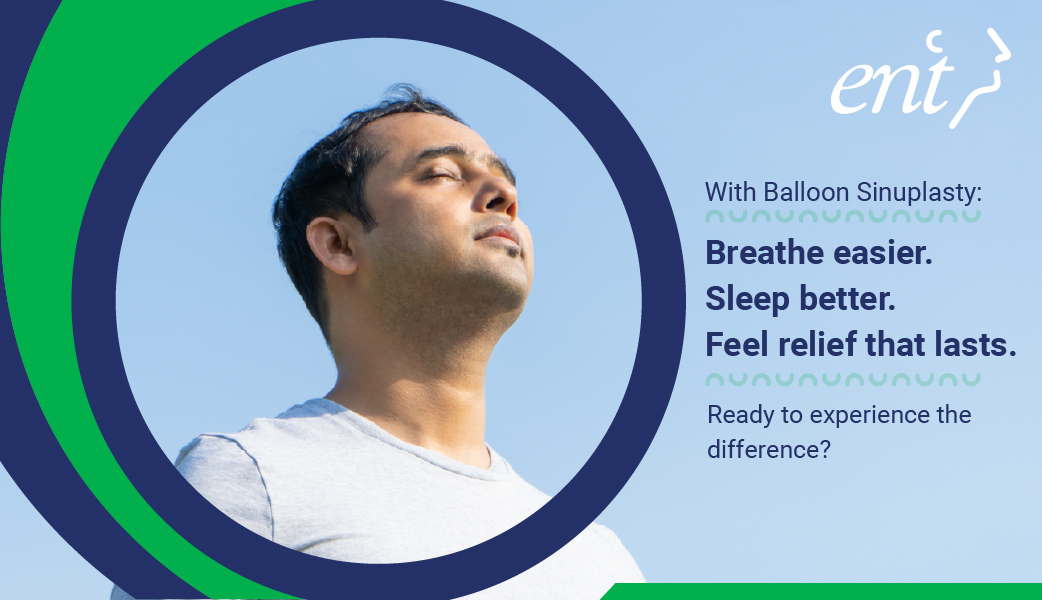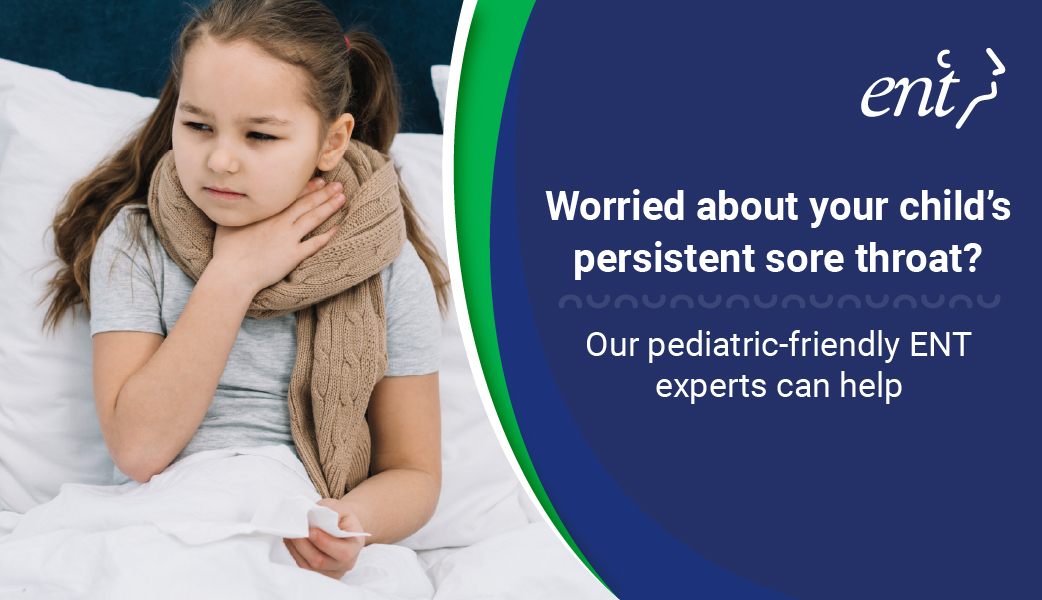What Parents Needs to Know About Pediatric Treatments for Chronic Ear Infections and Sore Throats
Kids get sick. It’s a normal part of growing up and nothing to be concerned about. However, some chronic illnesses, such as ear infections and sore throats, can have significant and long-lasting downsides for pediatric patients.
That’s why prompt treatment of these ailments is critically important. Unfortunately, the process can often take longer than it needs to. Parents may hesitate to contact a specialist directly, and it may take months to schedule an appointment with a primary care provider who can evaluate your child.
In many cases, patients with chronic ear infections or repeated sore throats will eventually be referred to an ear, nose, and throat specialist. ENTs can help patients with chronic ear infections hear better and those with sore throat after sore throat find relief from repeated infections. Contacting an ENT directly can often help your child get the help they need more quickly and more efficiently, so they can get back to the normal activities–and illnesses–of childhood.
Tonsil Treatments for Kids
There was a time–decades ago–when tonsil removal was seen as a kind of “right of passage” for children. While that’s no longer the case and physicians try to preserve the tonsils when possible, tonsillectomy remains one of the most common surgical procedures performed on minors in the United States.
The tonsils and adenoids serve to help insulate the body from germs which may enter the body through the mouth or nose. They’re loaded with white blood cells which help to eliminate any microscopic invaders. Unfortunately, in some cases, the tonsils can be too good at what they do–overreacting and causing repeated immune responses and infections.
Tonsillectomy and adenoidectomy address this problem by removing the tonsils and/or the adenoids. The procedure is generally performed under general anesthesia. There are no incisions to the skin, but the tonsils, the adenoids, or both are removed. Patients can experience a sore throat for several days, and full recovery may take up to two weeks. During this time period, you may have to ensure your child is taking appropriate doses of pain medication and altering their diet accordingly.
A successful tonsillectomy and adenoidectomy will mean your child will experience sore throat symptoms and infections far less often. They won’t miss nearly as much school and they’ll feel better and more energetic throughout the year.
When is Tonsillectomy and Adenoidectomy Performed?
In most cases, surgeons will make a determination regarding tonsillectomy and adenoidectomy on a case-by-case basis based on the unique medical history and presentations of each child. However, in general, benchmarks for this procedure include the following:
- Consecutive sore throats
- Sore throats that are commonly associated with a fever of over 101 degrees F.
- Repeated positive results for strep throat.
- A child that has trouble swallowing or is experiencing a blockage of the airway.
- An inability to stop bleeding from the tonsils.
- Sleep disordered breathing
- And more
If you have questions about your child and whether they are a good fit for tonsillectomy, you can talk to an ENT today. Make an appointment with ENT Medical Services to get your child seen fast.
Treatment for Chronic Ear Infections in Kids
While ear infections may occur at any age, they are particularly common among children. In most acute cases, ear infections are treated with antibiotics and rest. However, chronic or repeated ear infections can cause unique challenges that must often be addressed by an ENT.
Swelling and fluid buildup in the ear are both normal immune responses during an ear infection. When this occurs on a chronic basis, however, these symptoms can interfere with your child’s ability to hear. For toddlers, this is an important consideration, as hearing at this age is critical to building fundamental and lifelong speech skills.
Prompt treatment is important so your child doesn’t fall behind. In these cases, treatment often involves a minimally invasive surgical procedure. There are generally two options:
- Myringotomy: This procedure creates a small hole in the eardrum to allow drainage of fluid out of the middle ear.
- Tympanostomy: This procedure places a small tube in the ear. These tubes help ensure that sound waves have a clear path to the middle ear no matter the state of infection. With these tubes, your child will continue to hear well through chronic ear infections (which themselves can often resolve on their own as your child grows up).
These procedures often take as little as 10-15 minutes to perform. If tubes are places, they usually fall out on their own within two years (which is plenty of time in most cases), though they can be surgically removed if this doesn’t happen on its own.
Tympanostomy is one of the most common surgical procedures performed on children and generally results in excellent outcomes.
The Sooner You Get Treatment the Better
Because both chronic ear infections and repeated sore throats can have a detrimental impact on other areas of your child’s life, prompt treatment is usually strongly encouraged.
At ENT Medical Services, same day appointments are often available for patients who are experiencing chronic sore throats or ear infection symptoms. These appointments can help you quickly understand which treatment options may be best for your child’s long term health and wellness.
Want to make an appointment for your child? Call us at 319.351.5680 to get started!

Ear, Nose, & Throat, News
Why Choosing a Local ENT Makes a Difference
If you’ve waited weeks for a specialist or been shuffled between unfamiliar providers, you’re not alone.Quick help for chronic congestion, ear issues, allergies, or sinus problems shouldn’t be out of reach. Yourprovider choice matters. At ENT Medical Services, we offer a unique experience. We focus on local care, faster access, and a teamthat actually knows ...

Allergy, Ear, Nose, & Throat
5 Signs Your Allergies Might Need ENT Support This Fall
If your allergy symptoms aren’t going away or seem to be getting worse, you’re not alone. Fall in Iowa brings its own mix of triggers like ragweed, mold, and indoor allergens that linger long after summer fades. While over-the-counter medications help some people, they aren’t always enough. That’s when an ENT allergy specialist can offer ...

Sinus
Stuffy Nose That Won’t Quit? Try Balloon Sinuplasty
If you’re constantly dealing with sinus pressure, nasal congestion, or repeat infections, it’s easy to feel stuck in a cycle of temporary fixes. Maybe you’ve tried every nasal spray or antibiotic, only to have symptoms return. Balloon Sinuplasty offers a long-term, minimally invasive option for sinus relief, available here at ENT Medical Services. What Is ...

Sleep
Always Tired? Sleep Apnea Could Be to Blame
If you’re constantly asking yourself, “Why am I always tired?” even after a full night’s sleep, it might not just be a busy schedule or bad sleep habits. Chronic fatigue, morning headaches, and frequent grogginess can all point to an underlying condition called sleep apnea. Many people live with it for years without realizing that ...

Ear, Nose, & Throat
When Sore Throats Won’t Heal: What Parents Should Know About ENT Care for Kids
It’s tough watching your child struggle with a sore throat, especially when it keeps coming back, lasts for weeks, or never fully goes away. You’ve likely tried rest, fluids, and maybe even a few rounds of antibiotics. But when nothing seems to work, it’s time to consider a different approach. If your child constantly complains ...

Ear, Nose, & Throat
Ear Pain After Swimming? Here's When to Call an ENT
When your child bounds out of the pool all smiles, only to start tugging at their ear an hour later, it’s hard to know what to do. Is it just water trapped in their ear? Is it something more? Should you wait it out, or call a doctor? You’re not alone. Ear pain after swimming ...